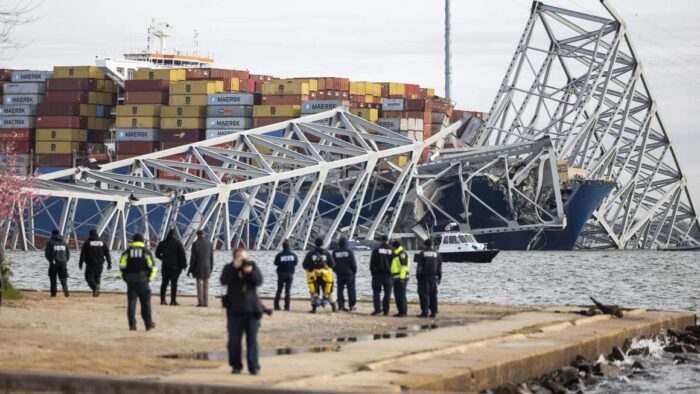ASCE Statement on Collapse of Francis Scott Key Bridge in Baltimore

Image: Rescue personnel gather on the shore of the Patapsco River after a container ship ran into the Francis Scott Key Bridge early Tuesday, causing its collapse. Jim Lo Scalzo/EPE-EFE/Shutterstock
The following is a statement by Marsia Geldert-Murphey, P.E., President, American Society of Civil Engineers (ASCE):
WASHINGTON, DC. – The American Society of Civil Engineers (ASCE) is saddened by the collapse of Baltimore’s Francis Scott Key Bridge after one of its support columns was struck by a container ship leaving the Port of Baltimore during the early morning hours of March 26, 2024. Safety is the primary concern of every civil engineering professional and ASCE’s thoughts are with all those who have been affected by this tragedy. We are developing an action plan to protect the health and safety of human life from harm due to a similar collision.
A bridge collapsing after being struck by a ship is extremely rare but not without precedent in the United States. In 1980, a sudden storm caused a freighter to crash into a support beam of Tampa Bay’s Sunshine Skyway Bridge. The collision resulted in a catastrophic failure of one the Skyway’s spans and the loss of 35 lives.
ASCE extends its full support to the national, state, and local first responders working to manage the crisis. As the situation continues to unfold, ASCE and its more than 150,000 members are standing by to support any official investigation of the factors that may have contributed to this shocking event.
ABOUT THE AMERICAN SOCIETY OF CIVIL ENGINEERS
Founded in 1852, the American Society of Civil Engineers represents more than 150,000 civil engineers worldwide and is America’s oldest national engineering society. ASCE works to raise awareness of the need to maintain and modernize the nation’s infrastructure using sustainable and resilient practices, advocates for increasing and optimizing investment in infrastructure, and improve engineering knowledge and competency. For more information, visit www.asce.org or www.infrastructurereportcard.org and follow us on Twitter, @ASCETweets and @ASCEGovRel.


